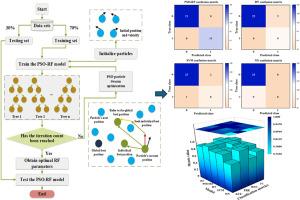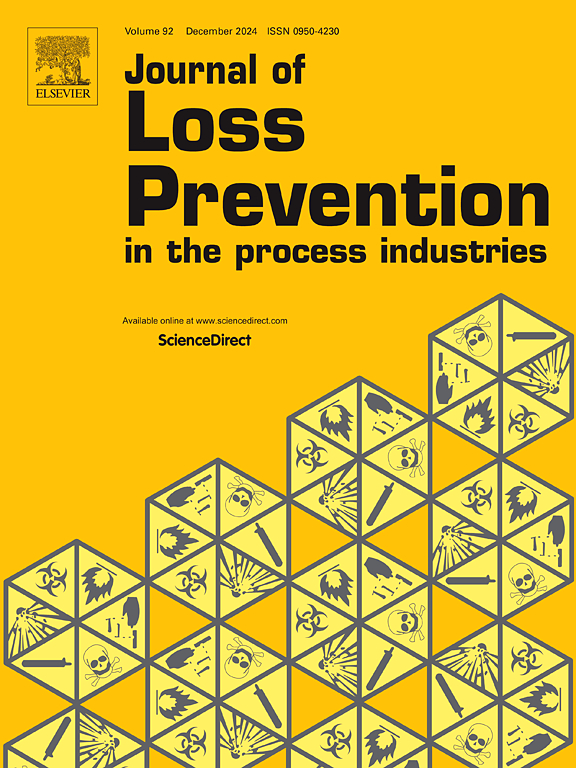Prediction of ventilation air methane explosion in regenerative thermal oxidation based on hyperparameter-optimized random forest algorithm
IF 4.2
3区 工程技术
Q2 ENGINEERING, CHEMICAL
Journal of Loss Prevention in The Process Industries
Pub Date : 2025-08-14
DOI:10.1016/j.jlp.2025.105757
引用次数: 0
Abstract
Regenerative Thermal Oxidation (RTO) is a key technology for utilizing Ventilation Air Methane (VAM), with safety assessments depending on accurate explosion predictions. This study develops a predictive model using a particle swarm optimization-random forest (PSO-RF) algorithm to determine whether methane will explode under various conditions in regenerative thermal oxidation. Experimental data were collected to determine the critical transition from oxidation to explosion. By integrating the ultra-lean methane oxidation kinetics model (GRTO) with Grey Relational Analysis (GRA), ambient temperature and methane concentration were identified as critical input features. The RF model's hyperparameters were optimized via the improved PSO algorithm to improve accuracy and computational efficiency. The dataset was randomly split into a training set and a testing set in a 7:3 ratio. The PSO-RF model was subsequently compared with Support Vector Machine (SVM), Decision Tree (DT), and Neural Network (NN) models. Results indicate that the PSO-RF model outperforms other models in key classification metrics on the test set, effectively predicting explosion risks under complex conditions.

基于超参数优化随机森林算法的蓄热氧化通风空气甲烷爆炸预测
再生热氧化(RTO)是利用通风甲烷(VAM)的一项关键技术,其安全性评估取决于准确的爆炸预测。本研究利用粒子群优化-随机森林(PSO-RF)算法建立了预测模型,以确定再生热氧化过程中不同条件下甲烷是否会爆炸。收集了实验数据,以确定氧化到爆炸的临界转变。通过将超贫甲烷氧化动力学模型(GRTO)与灰色关联分析(GRA)相结合,确定了环境温度和甲烷浓度为关键输入特征。通过改进的粒子群算法对射频模型的超参数进行优化,提高了模型的精度和计算效率。数据集以7:3的比例随机分为训练集和测试集。随后将PSO-RF模型与支持向量机(SVM)、决策树(DT)和神经网络(NN)模型进行比较。结果表明,PSO-RF模型在测试集的关键分类指标上优于其他模型,能够有效预测复杂条件下的爆炸危险性。
本文章由计算机程序翻译,如有差异,请以英文原文为准。
求助全文
约1分钟内获得全文
求助全文
来源期刊
CiteScore
7.20
自引率
14.30%
发文量
226
审稿时长
52 days
期刊介绍:
The broad scope of the journal is process safety. Process safety is defined as the prevention and mitigation of process-related injuries and damage arising from process incidents involving fire, explosion and toxic release. Such undesired events occur in the process industries during the use, storage, manufacture, handling, and transportation of highly hazardous chemicals.

 求助内容:
求助内容: 应助结果提醒方式:
应助结果提醒方式:


